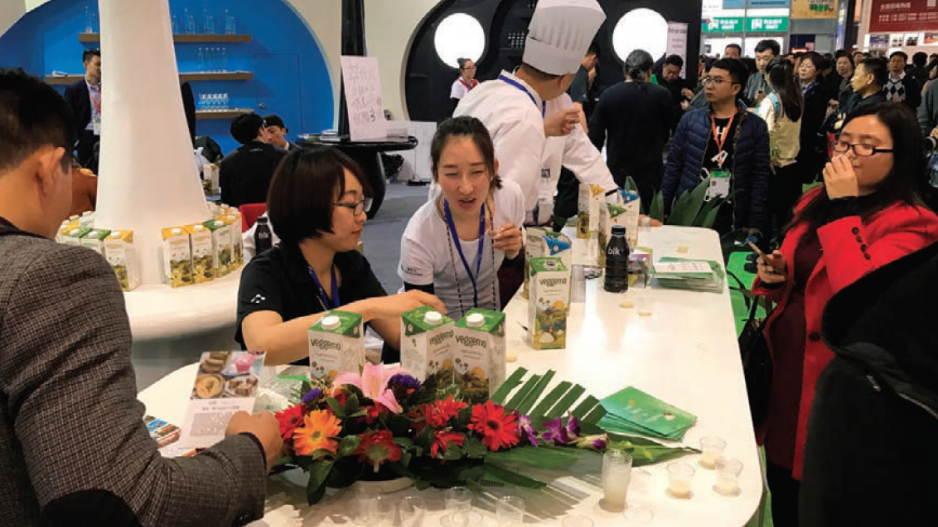A Vancouver-area company has landed its plant-based dairy-alternative beverage into the lucrative Chinese market after a customs approval process that lasted almost half a year, officials said.
Richmond-based Global Gardens Group Inc. said the first and second shipments of its Veggemo products have already arrived on Chinese shelves, and a third container will be headed to China within the month.
Entry into China was a critical victory for the fledgling company and product – founded in early 2016 but already seeing significant adoption in the North American market – because of the size of the rapidly growing, health-conscious consumer base of dairy alternatives in China, said Rob Harrison, president and CEO of Global Gardens Group.
“The alternative dairy products category is the fastest-growing category among those audited by AC Nielsen in supermarkets for 12 consecutive quarters.”
Harrison added that Veggemo – currently a shelf-stable product with a shelf life of 14 months without refrigeration – fits the market profile overseas even better than it does in North America.
“Shelf-stable products are only about 15% of the category in North America, but outside of North America, it’s almost 100% of the category. They are used to buying milk that’s unrefrigerated off the shelf, because they don’t have the cold-chain distribution system that we have in North America.”
According to a report by India-based analysis firm MarketsandMarkets, non-dairy alternatives – including soy, almond and other grain/vegetable-based “milk” – had a market size of US$9.5 billion as of 2015, with about half (US$4.23 billion) coming from Asia. The report also noted China was the biggest market in Asia, growing at an annual rate of 20.2%.
Warren Spence, CEO of V-Power, noted the success of a competitor – WhiteWave Foods’ Silk line of dairy alternatives – as an example of the growth potential for a non-dairy product entering China. V-Power is a joint venture by Global Gardens Group and Beijing-based Rocky Mountain Spring Water formed to distribute Veggemo in China.
“Silk went from nothing five years ago to almost US$100 million in sales by the end of 2016 in China alone,” Spence said. “So we looked at that and the size of the Chinese market, and the chance to hit such a big market for the brand. … There are a lot of studies out there about the Chinese population being lactose-intolerant, and how the growth of non-dairy beverages has started to increase.”
The process to get Veggemo approved – which took five months – was not without its challenges and lasted longer than expected, Harrison said. Much of the delay, according to Global, was due to Chinese customs authorities researching the details on each ingredient that goes into Veggemo, which is made from peas, cassava tapiocas and potatoes.
“Without the right partner, we probably would have gone elsewhere [before entering China],” said Harrison, who added that officials linked to Rocky Mountain Spring Water – some of whom live in Vancouver – were enthusiastic about investing in Global Gardens Group and bringing Veggemo to Asia from the outset of the company’s fundraising efforts.
“They attended our shows in both Toronto and Vancouver,” Harrison said. “We chose China because we felt it made a huge amount of sense, given we have a competent partner who can execute the plan.
“We knew, even if we have the money and the resources, we didn’t understand the Chinese market well enough to even contemplate going there on our own.”
Meanwhile, Veggemo is expected to hit the shelves at thousands of American supermarkets this year (along with an already sizable Canadian retail location count also in the thousands), and what’s driving the growth globally, Harrison noted, isn’t just an increasingly health-
conscious consumer base (mostly millennials and 70% female for Veggemo).
“Unbeknownst to a lot of people, retailers make very little money in the milk business,” said Harrison, who spent 32 years in the dairy industry. “It’s sold really as a loss leader. … The retailers are looking at the same figures that we have [on dairy alternatives sales], and they all say, ‘We need more stuff in this category.’ The more products you put in the [dairy-alternative] category, the better the margins are – because customers are asking for it.”
V-Power executives said they’re already looking at other Asian markets like Taiwan and Singapore as their next targets, but Spence said those plans are unlikely to take place this year.
“We want to make sure we do China right,” he said. “The last thing we want to do is to do it incorrectly, then launch the product in another country and make those same mistakes again. We want to make sure we establish ourselves in a good market and have the distribution across the whole country, so that we can use that model – or tweak it – when we go into other markets in Asia. And honestly, there’s enough volume in China to keep us busy this year and into next year.” •




